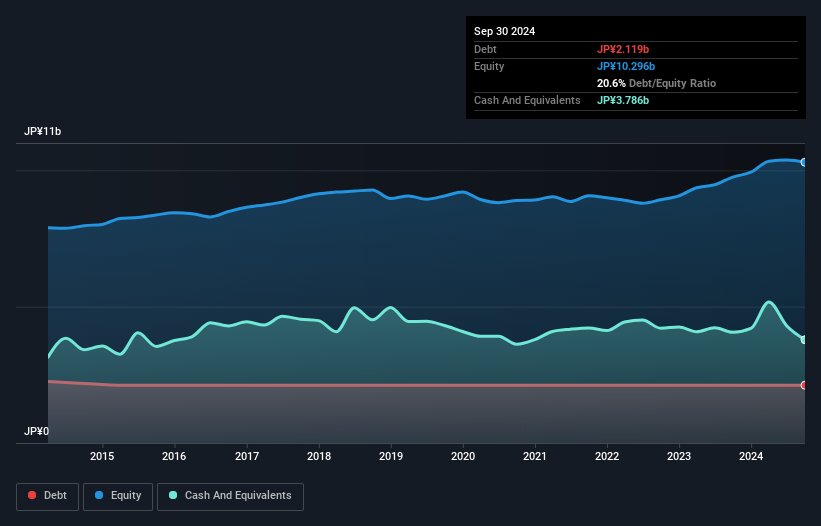
David Iben put it well when he said, 'Volatility is not a risk we care about. What we care about is avoiding the permanent loss of capital.' It's only natural to consider a company's balance sheet when you examine how risky it is, since debt is often involved when a business collapses. Importantly, Kitazawa Sangyo Co., Ltd. (TSE:9930) does carry debt. But the real question is whether this debt is making the company risky.
What Risk Does Debt Bring?
Debt assists a business until the business has trouble paying it off, either with new capital or with free cash flow. If things get really bad, the lenders can take control of the business. However, a more frequent (but still costly) occurrence is where a company must issue shares at bargain-basement prices, permanently diluting shareholders, just to shore up its balance sheet. Having said that, the most common situation is where a company manages its debt reasonably well - and to its own advantage. When we think about a company's use of debt, we first look at cash and debt together.
Check out our latest analysis for Kitazawa Sangyo
What Is Kitazawa Sangyo's Net Debt?
The chart below, which you can click on for greater detail, shows that Kitazawa Sangyo had JP¥2.12b in debt in September 2024; about the same as the year before. However, its balance sheet shows it holds JP¥3.79b in cash, so it actually has JP¥1.67b net cash.

How Strong Is Kitazawa Sangyo's Balance Sheet?
We can see from the most recent balance sheet that Kitazawa Sangyo had liabilities of JP¥6.21b falling due within a year, and liabilities of JP¥988.0m due beyond that. On the other hand, it had cash of JP¥3.79b and JP¥2.64b worth of receivables due within a year. So its liabilities outweigh the sum of its cash and (near-term) receivables by JP¥770.0m.
Of course, Kitazawa Sangyo has a market capitalization of JP¥7.05b, so these liabilities are probably manageable. Having said that, it's clear that we should continue to monitor its balance sheet, lest it change for the worse. Despite its noteworthy liabilities, Kitazawa Sangyo boasts net cash, so it's fair to say it does not have a heavy debt load!
The good news is that Kitazawa Sangyo has increased its EBIT by 6.4% over twelve months, which should ease any concerns about debt repayment. There's no doubt that we learn most about debt from the balance sheet. But it is Kitazawa Sangyo's earnings that will influence how the balance sheet holds up in the future. So when considering debt, it's definitely worth looking at the earnings trend. Click here for an interactive snapshot.
Finally, a company can only pay off debt with cold hard cash, not accounting profits. While Kitazawa Sangyo has net cash on its balance sheet, it's still worth taking a look at its ability to convert earnings before interest and tax (EBIT) to free cash flow, to help us understand how quickly it is building (or eroding) that cash balance. In the last three years, Kitazawa Sangyo basically broke even on a free cash flow basis. While many companies do operate at break-even, we prefer see substantial free cash flow, especially if a it already has dead.
Summing Up
Although Kitazawa Sangyo's balance sheet isn't particularly strong, due to the total liabilities, it is clearly positive to see that it has net cash of JP¥1.67b. On top of that, it increased its EBIT by 6.4% in the last twelve months. So we don't have any problem with Kitazawa Sangyo's use of debt. When analysing debt levels, the balance sheet is the obvious place to start. However, not all investment risk resides within the balance sheet - far from it. For example, we've discovered 2 warning signs for Kitazawa Sangyo that you should be aware of before investing here.
If you're interested in investing in businesses that can grow profits without the burden of debt, then check out this free list of growing businesses that have net cash on the balance sheet.
Valuation is complex, but we're here to simplify it.
Discover if Kitazawa Sangyo might be undervalued or overvalued with our detailed analysis, featuring fair value estimates, potential risks, dividends, insider trades, and its financial condition.
Access Free AnalysisHave feedback on this article? Concerned about the content? Get in touch with us directly. Alternatively, email editorial-team (at) simplywallst.com.
This article by Simply Wall St is general in nature. We provide commentary based on historical data and analyst forecasts only using an unbiased methodology and our articles are not intended to be financial advice. It does not constitute a recommendation to buy or sell any stock, and does not take account of your objectives, or your financial situation. We aim to bring you long-term focused analysis driven by fundamental data. Note that our analysis may not factor in the latest price-sensitive company announcements or qualitative material. Simply Wall St has no position in any stocks mentioned.
About TSE:9930
Kitazawa Sangyo
Sells food processing machinery and cooking equipment in Japan.
Flawless balance sheet with proven track record and pays a dividend.
Market Insights
Community Narratives




